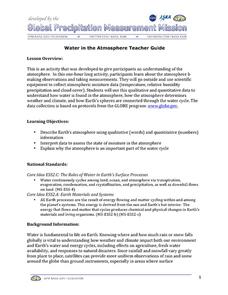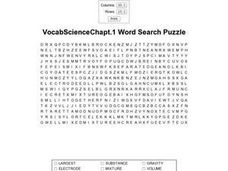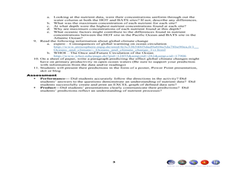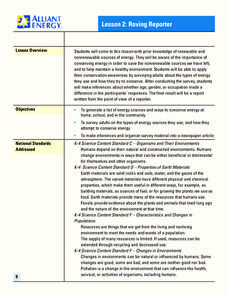Santa Monica College
The Density of Liquids and Solids
There are underwater rivers that flow on the ocean floor thanks to a difference in density. Scholars learn about the density in both liquids and solids in the second lesson of an 11-part series. They then determine the density of water,...
NOAA
Marine Ecosystems
Be at the top of the food chain when it comes to understanding marine ecosystems. The 21st installment of a 23-part NOAA Enrichment in Marine sciences and Oceanography (NEMO) program investigates marine ecosystems, ocean zones, and food...
Kenan Fellows
What Is Heat?
If objects have no heat, how do they can gain and lose it? Scholars experiment with heat, temperature, and specific heat of various substances. They create definitions for these terms based on their own conclusions to complete the fourth...
Curated OER
Code Makers - Electron Configuration, Aufbau Principle
Learners write the electron configuration of elements using the Aufbau principle. In this chemistry lesson, students build their own key that demonstrates the principle.
Curated OER
Temperature
Several slides compare different temperature scales. Thermal expansion, heat transfer, and Maxwell speed distribution are also explored. The last two slides seem unrelated to the topic of heat, but are easily left out of this otherwise...
Salt River Project
How Do We Clean Polluted Water?
How do we clean up oil spills and other pollutants in the water? Explore water treatment strategies with a set of environmental science experiments. Groups remove oil from water, work with wastewater treatment, and perform a water...
Curated OER
Water's Edge Café
Students observe water birds feeding at a local wetland, record what they see, and construct an appropriate menu for a "Waterfowl Cafe." They also play a "flocking" game.
Curated OER
Earth's Water
If the majority of our planet is covered with water, why do we need to bother conserving it? With a thorough and varied investigation into the location and types of water on the earth, learners will gain an understanding of why this...
Curated OER
Water in the Atmosphere
A slide show serves as the backdrop for a lesson on the moisture in Earth's atmosphere. Through it, mini meteorologists learn about the attributes of the atmosphere and actually use data-collecting weather tools to make observations and...
Curated OER
Water in Earth's Hydrosphere
Environmentalists test stream water for temperature, pH, and turbidity. Each group shares their information and then the class makes an overall evaluation of the water quality. A slide show sets the backdrop for the teaching portion and...
Curated OER
Water in the Biosphere
Environmental explorers examine the campus and take note of living organisms. Introduce them to the biosphere and the questions of the day: How much water can be found in the biosphere? A slide show helps you along, and even contains a...
Curated OER
Up, Up and Away
Third graders are presented with the problem of: Do all liquids evaporate at the same rate? The lesson contains adequate background information for the teacher. They participate in a lab experiment in order to test the scientific...
Curated OER
Angles: Angles, Angles, Everywhere
Students estimate and accurately measure the size of angles communicate with the appropriate geometric terms and symbols to describe and name angles, lines, line segments, rays
Curated OER
Vocab Science Chapter 1
In this word search activity, students locate 20 words related to science. The word list includes volume, mixture, and solute.
Curated OER
Periodic Trends
High schoolers explore the rationale behind the arrangement of the elements on the Periodic Table. Using internet and traditional research, students compare and contrast the properties of elements on the periodic table to determine a...
Curated OER
Bats and Hot Dogs
Students identify patterns and relationships from data that is collected and solve variables. In this investigative lesson students study ocean productivity, the nitrogen cycle and phytoplankton then answer questions.
Curated OER
Shake, Rattle and Roll
Students compare the weathering of different-sized materials. Comparisons are made and data analyzed to reach conclusions about the process of weathering. Applications can be made for the higher grades.
Curated OER
Enzymes
Tenth graders observe enzyme activity. They discuss the relationship between drug use and enzyme activity.
Curated OER
Three Clouds Activity
Learners explore how clouds are produced through three different age-appropriate hands-on experiments.
Curated OER
Let's Take a Rock Apart
Students take a crushed rock and sort the remains of the rock minerals into different categories based on the different properties. In this sorting lesson plan, students learn what makes up a rock and how to sort something into categories.
Curated OER
Geology Activities: Rock Making
Students create their own gems using a simple experiment and learning process in class.
Curated OER
Root, Root, Root for the Nutrients
Students observe the growth of a seed, predict what will happen when seeds are planted without soil, and conduct an experiment using a hydroponics system.
Curated OER
Roving Reporter
Learners write a report about energy use. In this conservation lesson, students interview adults about their use of renewable and nonrenewable energy. Learners synthesize this information and write a report from the point of view of a...
Curated OER
Acid Rain
Students use real-time weather maps to determine the likelihood of acid rainfall in a region. Students apply their understanding of interaction between weather systems, land and air pollution, to address acid rain and the effects on...








